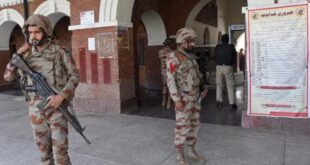A top Chinese law enforcement official has called on police and local governments to step up their use of big data, artificial intelligence, and networked security cameras to stem potential social unrest in times of “growing uncertainty.”
Chen Yixin, secretary general of the ruling Chinese Communist Party (CCP)’s political and legal affairs commission that overseas domestic security, called on law enforcers to “lay a solid foundation for social governance and security now.”
He told a meeting on grassroots governance on the southern province of Guangdong on Sept. 19 that the move would implement instructions from CCP leader Xi Jinping to “study new measures to improve grassroots social governance capabilities.”
The security situation at home and overseas was getting more complex, with a growing risk of instability, Chen was quoted by state media as saying.
“Grassroots social governance has faced some new situations and new problems, which require us to conduct in-depth research [and] continue to innovate with ideas and new measures,” he said, citing sexual assault of “left-behind children” and human trafficking as top of the priority list.
“For serious criminal crimes in rural areas, it is necessary to overcome the problem of insufficient police force in grassroots police stations,” Chen said.
The conference took place in Shenzhen, where authorities in Guangming district are part of a pilot program of measures giving law enforcement powers to administrative officials, and officials from across China are learning how to implement it, according to the state-backed social media news channel WePolitics.
The growing emphasis on “grid-based” law enforcement and monitoring comes amid growing coverage in state-run media of the need to prevent espionage, Chinese political commentator Willy Lam told RFA.
But he said rising unemployment rates had led to growing concerns over social instability, and different branches of government are increasingly working together to prevent “mass incidents” from happening.
“For example, in Dongguan city in Guangdong, a lot of factories have closed, and there are no new orders coming in,” Lam said. “If the local security point hears about something, for example, someone saying they are going to organize a demonstration, they are obliged to inform the local police station.”
“The authorities are hoping that these disputes can be nipped in the bud before those people get as far as the municipal government offices, preferably at neighborhood committee level,” he said.
Grid management system
Local officials at township, village, and neighborhood level have been empowered to enforce the law under an amended administrative punishment law that took effect in July 2021, as well as operating a vastly extended “grid management” system of social control in rural and urban areas alike.
The system will be based on a “grid” system of management, a system of social control that harks back to imperial times, and which will allow the authorities even closer control over citizens’ lives, the opinion document issued jointly by the CCP central committee and the country’s State Council said.
According to directives sent out in 2018, the grid system carves up neighborhoods into a grid pattern with 15-20 households per square, with each grid given a dedicated monitor who reports back on residents’ affairs to local committees.
Neighborhood committees in China have long been tasked with monitoring the activities of ordinary people in urban areas, but the grid management system turbo-charges the capacity of officials even in rural areas to monitor what local people are doing, saying, and thinking.
According to a recruitment advertisement posted online in 2018, the task of a grid monitor for a neighborhood committee is to fully understand the residents of their grid, including exactly who lives where, which organizations they belong to, and the sort of lives they lead.
They will be asked to mediate in family conflicts and other disputes and to carry out “psychological intervention” when required, as well as to report back on “hidden dangers” in their grid, as well as all the aspects of residents’ lives, political opinions, and complaints, the advertisement said.
That system is now being “modernized,” with full data sharing between organizations and widespread automation the goal, according to a July 11 opinion document from the central leadership.
Chen Yixin told the Shenzhen conference that there are still “blind spots” in smart surveillance systems in some places, and called for more cameras to be added to the Golden Shield nationwide network-security system to eliminate them, as well as the use of big data to monitor potential risks.
Total surveillance
Beijing-based dissident Ji Feng said the CCP is aiming for total surveillance of the population.
“Once you walk out of your front door, nothing is secret,” Ji told RFA. “There is a camera right next to [my door], so they basically know when I go out and when I come home.”
“They can monitor us using existing equipment, searching for our data, including facial recognition,” he said. “Facial scans are needed for lots of things now.”
“They are trying to improve on the systems that already exist; they call it optimization.”
Jiangsu-based current affairs commentator Zhang Jianping said a society that has no independent judiciary and huge inequality is forced to rely on such methods.
“Without that, so-called social stability can only be maintained through informing, monitoring, and exposing [people],” Zhang told RFA.
 Eurasia Press & News
Eurasia Press & News



